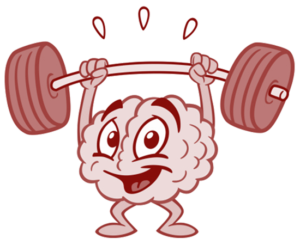For those of us who’ve traversed the mid-life mark, it’s easy to see the signs of aging on our bodies no matter how much effort we put into maintaining them! We may fail to recognize that the impact of the passing years is just as prevalent on our brains. If we could catch a glimpse of plaque formation and tangles amid our gray matter, we might get motivated to do something about it – especially those of us who have cared for parents or grandparents with geriatric dementia.
 In The Memory Bible: An Innovative Strategy for Keeping Your Brain Young, Dr. Gary Small tells us that it is far easier to prevent the loss of cognitive ability than to attempt to restore it. Fortunately, much like our muscles, our brains are designed to become more effective the more we exercise them. As a case in point, people who engage in mentally challenging jobs or pursuits enjoy a substantive measure of protection from future memory losses.
In The Memory Bible: An Innovative Strategy for Keeping Your Brain Young, Dr. Gary Small tells us that it is far easier to prevent the loss of cognitive ability than to attempt to restore it. Fortunately, much like our muscles, our brains are designed to become more effective the more we exercise them. As a case in point, people who engage in mentally challenging jobs or pursuits enjoy a substantive measure of protection from future memory losses.
Dr. Small’s book provides a time-tested prescription for maintaining youthful brains. Here are a handful of techniques he recommends.
LOOK, SNAP, CONTEXT: Look actively at what you want to learn or remember. Slow down. Pay attention. Take in all of the sensory information. Create mental snapshots of memories. Fix them into long term memory by creating vivid and memorable images of the source material. For example, to remember that someone’s name is “Pat,” imagine a giant pat of butter melting on that person’s head! Connect all of these snapshots together into a cohesive story or chain. Use acronyms or other memory devices to help you.
MINIMIZE STRESS: Stress wears away at our brain fitness and overall memory performance. Avoid overloaded schedules, sleeplessness, ruminating, worrying, pessimism. Rather, set realistic expectations, pace yourself, schedule time outs, shrug things off, laugh, and relax!
TAKE ON HEALTHY CHALLENGES: Stretch yourself cognitively. (Use it or lose it!) Give yourself new mental mountains to climb. Introduce yourself to unfamiliar situations that you’ll have to master. Work on puzzles and brain teasers. And stay connected to the biggest brain teasers of all – other people! Yep – socialization is great for the brain.
EAT WELL: Those unhealthy diets that clog up the arteries in your heart also clog up the arteries in your brain. As such, eliminate processed foods, limit animal fats, and increase consumption of whole grains, fresh vegetables, and fruits. Healthy diets also help control blood pressure which reduces the risk of stroke.
EXERCISE: Physical activity and aerobic conditioning promote brain fitness. Exercise improves executive functioning – making plans, scheduling and carrying out activities, coordinating events, controlling adverse emotional states.
EXPAND YOUR MEMORY POWER: Put effort into writing effective notes; they’ll serve as useful memory aids. Be strategic about where you put things and hold fast to those decisions (e.g., wallet, car keys, bills to be paid). Use daily planning lists and weekly/monthly planning calendars. Place Post It notes where you’ll see them for important reminders. Create good habits that you’ll carry out without thinking much about them. (And avoid grooving on bad ones!) Follow a daily routine.